|
|
|
Sort Order |
|
|
|
Items / Page
|
|
|
|
|
|
|
| Srl | Item |
| 1 |
ID:
069815


|
|
|
| 2 |
ID:
190179


|
|
|
|
|
| Summary/Abstract |
In the last decade, a growing body of literature has investigated the promotion of good governance, rule of law, democracy and human rights in Central Asia through funding from the European Union (EU). Most of this research has taken an EU-centric approach and is concerned with the supply side of external democratization. As a result, little is known about how EU projects are implemented on the ground and what EU-funded civil society organizations consider to be their priorities. This article investigates the agency of such organizations in Kyrgyzstan by focusing on their contribution to one particular EU instrument: the Instrument contributing to Stability and Peace (IcSP), and its programme: Strengthening Resilience to Violence and Extremism (STRIVE). The findings offer new insights into the processes of adaptation, reinterpretation and contestation through which EU-funded organizations exercise ownership while engaging in the prevention of violent extremism (PVE).
|
|
|
|
|
|
|
|
|
|
|
|
|
|
|
|
| 3 |
ID:
176504


|
|
|
|
|
| Summary/Abstract |
This article examines best practices in local ownership of Track Two diplomacy. Taking as a starting point the idea that best practices change over time as conflicts and social responses to them change, the article seeks out recent innovations and practices in Track Two diplomacy, focusing on practices of local ownership. A series of two reflective practice workshops with facilitators of Track Two processes offer insights on local ownership in current Track Two diplomacy. More in-depth examination of the Georgian-South Ossetian case illustrates an example of increasing local ownership developing over time during a ten year Track Two process. Together, the reflective practice workshops and the case study suggest team approaches to Track Two diplomacy so that insiders and outsiders work together as a team to facilitate, bringing the strengths of both insiders and outsiders to Track Two processes.
|
|
|
|
|
|
|
|
|
|
|
|
|
|
|
|
| 4 |
ID:
171163


|
|
|
|
|
| Summary/Abstract |
By emphasizing concepts such as resilience and local ownership, recent updates in the EU's foreign policy strategy have marked a narrative turn and signaled a shift in EU external governance toward its neighborhood. This article has two aims. First, we unpack the EU's conceptual understanding of resilience and local ownership as reflected in its recent strategic documents. Second, we examine the implications of the EU's narrative turn on actual policy practices in Eastern Partnership countries. We highlight a gap between the EU's broad understanding of resilience and local ownership and the narrow operationalization of these concepts in the EU's eastern policy. The article shows that the EU continued relying on the previously established policy frameworks, according to which resilience develops through approximation with EU templates. This strong path dependence precluded any effective policy turn toward local ownership.
|
|
|
|
|
|
|
|
|
|
|
|
|
|
|
|
| 5 |
ID:
173742


|
|
|
|
|
| Summary/Abstract |
Internationally sponsored interventions in fragile and conflict-affected states are often resisted by domestic actors who have deep local knowledge, profoundly different expectations of political processes, and keen desires to shape their country’s future. Many forms of local resistance can damage or stall the progress of externally driven peacebuilding, but the critical peacebuilding literature has suffered from an inability to articulate coherent strategic alternatives to the dominant paradigm of liberal interventionism. This paradigm, we argue, is actually part of what fuels continued resistance: as external actors seek to implant liberal democratic norms into local bureaucratic and political cultures, countless sites of conflict emerge, with local and international actors jockeying between and amongst each other for position, resources, and control over the specificities of reform. These struggles – effectively a competition over local ownership – are at the centre of peacebuilding and will determine short- and long-term intervention outcomes. Focusing on the case of political reform in Afghanistan, this article develops a grounded theory of ownership as ‘meta-conflict’, in which participant voices from local and international peacebuilding leaders, working in-country, are given a primary role in determining the compatibility of the donor community’s prevailing liberal agenda with local requirements for building peace.
|
|
|
|
|
|
|
|
|
|
|
|
|
|
|
|
| 6 |
ID:
094588
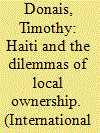

|
|
|
| 7 |
ID:
155691


|
|
|
|
|
| Summary/Abstract |
One of the core principles of EU interventions under the Common Security and Defence Policy (CSDP) has been local ownership. While the EU takes pride in fully respecting this principle, the existing research suggests that the implementation has been far from smooth. However, we still know very little how this principle is conceptualised and operationalised, let alone why its implementation has been so difficult. Drawing on document analysis and 27 in-depth interviews, the article makes 3 arguments. First, ownership is increasingly construed in the EU policy rhetoric as a middle ground between imposition and restraint. Second, in practice, ownership is operationalised as an externally driven, top-down endeavour, resulting in the low degree of local participation. Third, in addition to the obstacles normally faced by other peace-builders, the EU’s efforts to implement ownership are constrained by the politics and policy-making of CSDP. The arguments are illustrated in a case study of the European Union Mission on Regional Maritime Capacity Building in the Horn of Africa (EUCAP Nestor).
|
|
|
|
|
|
|
|
|
|
|
|
|
|
|
|
| 8 |
ID:
138821


|
|
|
|
|
| Summary/Abstract |
The UN asserts that local ownership boosts the legitimacy and sustainability of peacebuilding by preserving the principles of self-determination and nonimposition in an activity that can contravene them. At the same time, it also perceives local ownership to imperil the achievement of its operational goals, thus bringing its normative and operational obligations into conflict. This article evaluates the UN’s discourse and operationalization of local ownership, showing that despite the UN’s invocation of ownership discourse, it operationalizes ownership in restrictive ways that are intended to protect the achievement of operational goals but that consequently limit self-determination and increase imposition. Moreover, because of contradictions in the UN’s practices of ownership, it also undercuts its ability to realize the very operational goals that it is trying to protect.
|
|
|
|
|
|
|
|
|
|
|
|
|
|
|
|
| 9 |
ID:
157978
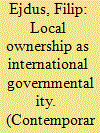

|
|
|
|
|
| Summary/Abstract |
While some Foucault-inspired studies construe local ownership in international interventions as a form of liberal governmentality that aims to govern through freedom, others lambast it as an illiberal governmentality that is likely to be resisted because it undermines local autonomy. However, we still do not know what is the rationality behind local ownership, how it is being operationalized, and why a principle that aims to govern through freedom ends up curtailing it. I argue that local ownership, echoing the colonial principle of indirect rule, is driven by the rationality of advanced democracies on how best to govern global insecurities at a distance. Consequently, ownership is operationalized as responsibilization for externally designed objectives. This often gives rise to local resistance which undermines international efforts to achieve ownership. I illustrate my arguments with evidence from the EU Mission on Regional Maritime Capacity Building in the Horn of Africa (EUCAP Nestor).
|
|
|
|
|
|
|
|
|
|
|
|
|
|
|
|
| 10 |
ID:
153339
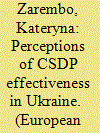

|
|
|
|
|
| Summary/Abstract |
This article makes a contribution to the little explored issue of evaluating the effectiveness of the EU Common Security and Defence Policy (CSDP). Drawing on the interviews with local beneficiaries of two missions in Ukraine, one CSDP proper (European Union Advisory Mission) and the other a “hybrid” mission (EU Border Assistance Mission), the article analyses which factors shape the local beneficiaries’ perception of a mission being effective or non-effective. It shows the reputational approach deriving from the organisational theory can offer a fruitful theoretical framework for understanding CSDP perceived effectiveness on the ground. The article contributes to the studies of CSDP and its engagement with the host state as well as to the nascent academic and policy literature on CSDP and Ukraine.
|
|
|
|
|
|
|
|
|
|
|
|
|
|
|
|
| 11 |
ID:
120003


|
|
|
|
|
| Publication |
2013.
|
| Summary/Abstract |
Cambodia has established a special tribunal to try former Khmer Rouge cadres. For such a transitional justice programme, local ownership is deemed to be crucial. This article assesses public perceptions of the tribunal by analysing interactions between local participants and tribunal officials in public forums held by a local non-governmental organization (NGO). In doing so, it identifies sound reasons for Cambodians' pervasive indifference, as indicated in preceding surveys. The article has implications for the ownership of transitional justice programmes, suggesting that such nationwide forums must be recognized as a unique device for eliciting local perceptions, because they differ from traditional mainstream survey methods.
|
|
|
|
|
|
|
|
|
|
|
|
|
|
|
|
| 12 |
ID:
161122
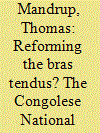

|
|
|
|
|
| Summary/Abstract |
The security sector reform (SSR) programme in the Democratic Republic of the Congo (DRC) has failed, according to a former high-level member of the United Nations (UN) mission in the DRC, as a large section of the country remains outside government control, and the security institutions of the state continue to constitute one of the predominant sources of insecurity for the local population in a number of ways. Based on several field studies, this article critically scrutinises the SSR of the Congolese National Police (Police nationale congolaise; PNC) and the efforts to reform it between 2004 and 2016. It further attempts to explain why so little progress was made in the SSR of the PNC, despite extensive involvement from donors. The article shows that the instrumental and traditional approach to SSR is partly to blame, because in this case it failed to address the root problems and initiate the needed fundamental reform and reconstruction of the police force. It also shows that reforming local security institutions becomes even more difficult when the local authorities do not support the effort.
|
|
|
|
|
|
|
|
|
|
|
|
|
|
|
|
| 13 |
ID:
152384
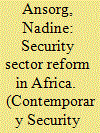

|
|
|
|
|
| Summary/Abstract |
Many African states have security sector reform (SSR) programs. These are often internationally funded. But how do such programs account for previously existing security institutions and the security needs of local communities? This article examines SSR all over Africa to assess local ownership and path dependency from a New Institutionalist perspective. It finds that SSR, particularly in post-conflict countries, tends to be driven by ideas and perceptions of international donors promoting generalized blueprints. Often, such programs only account in a very limited way for path-dependent aspects of security institutions or the local context. Hence, the reforms often lack local participation and are thus not accepted by the local community eventually.
|
|
|
|
|
|
|
|
|
|
|
|
|
|
|
|
| 14 |
ID:
154707


|
|
|
|
|
| Summary/Abstract |
The existing guidelines for security sector reform (SSR) tend to draw on theoretical work in the field of civil–military relations, which in turn has been derived from Western, liberal democratic models of governance. Although guidelines strongly advise that local culture and context need to be considered when drawing up objectives for post-conflict SSR programmes, this is not often reflected in practice. This article considers some of the reasons for this, citing both in-country challenges and donor-related issues, and suggests that one of the biggest problems is a lack of alternative, non-orthodox models of civil–military relations to draw upon. It is further suggested that elements of suitable alternative models may be found in states which possess political structures not entirely dissimilar to the Western, liberal democratic ideal, but which can offer different perspectives. Detailed research of these structures should produce a pool of sub-models which could then be employed to create bespoke, culturally appropriate objectives for use in post-conflict SSR programmes.
|
|
|
|
|
|
|
|
|
|
|
|
|
|
|
|
|
|
|
|
|